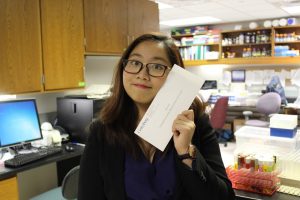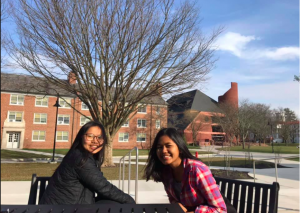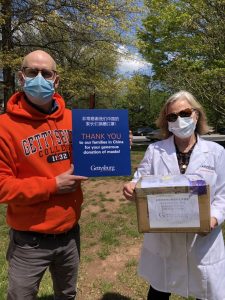By Huanjia Zhang, Contributing Writer
Known for its town square, churches, antique stores, and pick-up trucks, central Pennsylvania’s Gettysburg is the quintessential American small town. It contains rich Civil War history and prides itself on the eponymous Gettysburg Address. Gettysburg also hosts 147 international students from across the globe, and they are enrolled at Gettysburg College — a small, residential liberal arts college that has resided in the northwest corner of the town since 1832.
As is the case with many small towns, Gettysburg — with its farms and four-wheelers — poses a range of challenges for foreigners. The closest Chipotle is a half-hour drive away, major grocery stores are far by foot, and the only bus that stops at the college runs once every hour. Despite the surrounding Americanness, however, most international students at Gettysburg College are able to find a sense of belonging within the college’s close-knit community. They eat meals with their American friends, live with their American roommates, complete group projects with their American classmates, and keep themselves busy with the ample curricular and extracurricular activities on campus.
But with the coronavirus engulfing America in March and the campus closing for remote learning, international students’ sense of belonging in this country is being challenged in new ways.
Mai P. Trinh ’20, a recent computer science graduate hailing from Vietnam, is currently experiencing many forms of exclusion. She had planned to work in the U.S. by participating in the Optional Practical Training (OPT) program — a short-term employment authorization that allows F-1 visa students to work in their field of study.
“It was never my intent to settle in and have a life in the U.S.,” said Trinh. “But I think having professional working experience in America would help me tremendously when I go back to Vietnam and find a job there.”
Knowing that finding a job as an international student wouldn’t be easy, even before the pandemic, Trinh had gone above and beyond to hunt for job opportunities. She went to networking events, sent out mass emails, consulted with career service advisors, and shadowed professionals in her field.
Nevertheless, for Trinh and millions of other graduating international students across the country seeking professional development opportunities, the somber job market caused by the COVID-19 pandemic and the stringent immigration restrictions have made their hopes of working in the U.S. almost impossible.
Trinh received two internship offers before the pandemic — one from a start-up company in Boston and the other from a large company in Philadelphia. Both offers were rescinded due to hiring freezes, and her on-site interviews with two other companies have also been canceled.
Despite her difficulty finding employment during this crisis, Trinh must leave the U.S. if she fails to secure a job by the end of the summer. Under the current rules set by the United States Citizenship and Immigration Services (USCIS) — an agency within the Department of Homeland Security (DHS) that approves and regulates foreign students’ employment authorizations — international students have, in aggregation, up to 90 days to be unemployed after their OPT program starts. And once their unemployment has reached this limit, they must leave the country.
Notwithstanding the pleas from many international students and advocacy groups, the DHS has resisted extending the unemployment limits for international students on OPT during this extraordinary time.
Frustrated and exhausted from a job-hunting failure that is largely out of her control, Trinh is now residing in South Philadelphia with a friend who kindly accommodated her when Gettysburg College closed. Contrary to her previous plans, Trinh has decided to return to Vietnam as soon as the Vietnamese border reopens. She says that she no longer feels like she belongs in this country.

Mai P. Trinh ’20, an international student from Vietnam, was visiting the Grand Canyon National Park in Arizona right before the college announced that it would extend spring break due to the COVID-19 outbreak (Photo courtesy of Mai P. Trinh)
Unfortunately, Trinh isn’t the only graduating international student struggling to keep future plans in the U.S. intact while overcoming the barriers imposed by both the federal government and COVID-19. When the College decided to close the campus for the rest of the semester and switch to remote learning in March, San K. Luc ’20, a recent graduate in biology and East Asian studies who is also from Vietnam, was away from campus on spring break.
“My boyfriend had to FaceTime me the entire time to help me pack up my belongings virtually,” Luc explained, recalling the fiasco.
On top of the sudden chaos of a school closure, she found her situation more despairing when all seven of her graduate school applications were rejected. Luc had worked hard throughout college — she maintained good grades, worked as a research assistant for years, and spent three summers doing research, both on campus and at the Mayo Clinic.
Hoping to stay and work in the U.S. to boost her chances of getting into a graduate school during the next application cycle, she scrambled to apply for OPT and find employment. She too would have to leave the country if she did not find a job 90 days after her OPT start date.
“It was an incredibly stressful time,” said Luc, currently staying with a friend in North Carolina. “The most frustrating part was that, even though you knew you were doing everything you could, the chance of getting a job during the pandemic is still very little.”

San K. Luc ’20, a Vietnamese international student, recently graduated from Gettysburg College with degrees in biology and East Asian studies (Photo courtesy of San K. Luc ’20)
She was verbally offered a research technician position in her research advisor’s lab. However, with the College’s hiring freeze and furloughing of staff members due to financial difficulties, Luc wasn’t sure if the offer still stood. But just weeks before her graduation, she got the good news that the research technician offer had finally been approved. With little time to catch her breath, Luc now worries about her only employment being affected by USCIS’s delayed approval of her employment authorization. Many international students experienced this issue last year.
The pandemic has not only devastated graduating international students — it also has placed a tremendous mental toll on the underclassmen.
Srey Nich Vunn ’22, a first-generation college student studying economics and international affairs, came to Gettysburg from a small village in Cambodia. Both her grandparents and parents survived the Cambodian genocide.
When the pandemic began to cause the unraveling of many services across the U.S., Vunn found herself on a near-empty campus during spring break after her college-organized trip to Puerto Rico was canceled. She attempted to go back to Cambodia to stay with her family, but her first flight was canceled and the second flight required a health clearance form that she could not easily obtain. Luckily, she was able to stay with an American host family through SHE-CAN, the nonprofit organization that first helped her get into colleges in the United States.

Srey Nich Vunn (right), a first-generation college student studying economics and international affairs, came to Gettysburg from Cambodia (Photo courtesy of Srey Nich Vunn ’22)
“I definitely feel pessimistic about my future, I don’t know what will happen to me when I graduate,” said Vunn. She has witnessed many of her graduating international friends struggling to land the OPT jobs she herself wants after graduation.
Vunn had also worried about being able to find an internship this summer. It has been historically difficult for international students to find off-campus internship opportunities, with many programs being restricted by law to only accept U.S. citizens or permanent residents. With many companies and organizations instituting across-the-board hiring freezes nationwide and the cancellation of many on-campus internships, it has become even harder for international students to hone the skills they have learned in college courses.
Against all odds, Vunn received a summer internship offer from Vital Voices, a D.C. based nonprofit that advocates for women around the globe. She hopes to apply this experience towards her goal of becoming a human rights lawyer, and would like to return to Cambodia to help other women to have a better education and life.
“It is discouraging that this is the world that we are living in,” Vunn commented about the increasingly hostile environment toward international students and other minority groups. “But, in a way, it really motivates me to work hard and change it.”
Regardless of the adversity they’re facing, the pandemic has not stopped international students from helping the Gettysburg community. In early April, tens of thousands of face masks, donated by Chinese international students’ families, began to arrive in Gettysburg from China.
Brad Lancaster, the Director of International Student Services at Gettysburg College, was impressed with how fast the masks arrived and how many there were.

Chinese international students’ families have donated over 10,000 masks to Gettysburg College (Photo courtesy of Brad Lancaster)
According to Lancaster, Chinese international students’ parents had reached out to him over WeChat — a popular Chinese messaging app — to express their interest in donating masks to Gettysburg. In March, after consulting with the Health Center, he decided to accept these mask donations for the community.
“As soon as I sent out the message, the parents immediately started to work together,” he said. “And I woke up to over 500 messages in the WeChat group the next day.”
Over the course of three or four shipments, the college received more than 10,000 masks from the Chinese international students’ parents, which was enough to meet not only the College’s needs but also those of the retirement homes, police force, food pantries, and various other organizations within Gettysburg and the surrounding community.
“If you look at Abraham Lincoln’s Gettysburg Address, you will find the special callings for unity and human equality,” said Lionel Hong, a Gettysburg College international alumnus who graduated in 2012. Hong currently works in his hometown of Beijing, operating a start-up company that designs and manufactures sports apparel. Using his expertise in international trade, he volunteered much of his time consolidating the donated masks from the parents all over China and filing paperwork with Chinese Customs to oversee shipment to Gettysburg.
It wasn’t easy for these parents to source the masks — they were still high-demand commodities in China, despite relative COVID-19 containment. “The parents have spent a lot of energy to source large quantities of masks within a short amount of time for this donation,” said Hong.
Hong feels that these efforts were well worth it, and explained that the pandemic has changed his perspective on a lot of things. Things that he used to think mattered suddenly don’t matter anymore — people can make dedicated office spaces in their homes and can communicate clearly without physically showing up in meetings.
“The only thing that seems to matter now,” he said, “are people’s lives.”
To many people, the stories of these international students during the pandemic — their struggles, their hard work, their resilience, and their strong sense of generosity — are what actually make Gettysburg quintessentially American.
